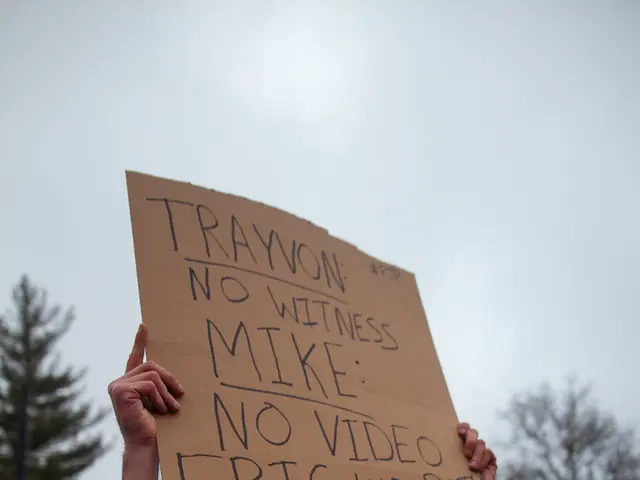Facebook's Pro-Russian Disinformation Wave: A Threat Ahead of European Elections
Russia Employs Disinformation Tactics on Facebook, promoting anti-Ukrainian sentiments towards Poland
In a chilling prelude to the European elections, Poland finds itself at the crossroads of a riptide of pro-Russian propaganda on Facebook. These messages, designed to stir discord and propagate anti-Ukrainian and anti-EU sentiments, have been unearthed by Politico, underscoring the arduous task of combating misinformation on social media.
Research by two non-profit groups, AI Forensics and CheckFirst, reveals that about 275 sponsored posts brimming with misinformation reached over 3 million Facebook users in France, Germany, Italy, and Poland during May. These posts chopped segments off Ukraine and its support, peddling narratives that smeared the country and cast doubts on the legitimacy of the aid provided to it.
Veřa Jourová, Vice-President of the European Commission, warns of the approaching battle against disinformation, stating to the Polish Press Agency (PAP), "The European elections will be our test of resilience to disinformation." To reinforce the sentiment, the European Commission initiated an investigation into these misinformation campaigns a month ago.
The false advertisements utilized a myriad of strategies to reach their audience. In Poland, ads spouted messages like, "We're accustomed to constant reports of thefts in Ukraine, but sometimes Ukrainian thieves leave us astonished." Similar ads in Italy, from nine distinct fake accounts, claimed that Ukrainian conflict spending would jeopardize Italy's future. These ads manipulated a 2014 photo of an unemployment queue in Madrid, deceitfully implying it depicted current economic woes intensified by Ukraine aid.
Amaury Lesplingart, co-founder of CheckFirst, criticizes Meta, stating, "The deluge of ads violating platform rules is a wake-up call for Meta and regulatory bodies to enforce laws more rigorously." Despite Facebook's policies mandating advertisers to provide official identification and limiting promotions to their native country, enforcement has seemed lax. Researchers noted that approximately 65% of political and social issue ads went unlabeled in 16 EU countries, and Meta removed fewer than 5% of the ads.
Meta challenges the researchers' findings, particularly their definitions of political ads and their failure to account for ads blocked pre-publication. European Commission spokesperson Thomas Regnier, however, confirmed an ongoing investigation, saying, "The Commission is examining new evidence provided by AI Forensics."
This campaign sheds light on the relentless menace posed by Russian disinformation operations, as the EU gears up for crucial elections. The dispersion of these ads across major European countries signifies a wider strategy to destabilize the region and dent support for Ukraine.
The investigation by the European Commission will likely scrutinize Meta's ad monitoring and removal processes to thwart similar breaches in the future. This situation also invokes broader questions about the role of social media in political dialogue and the safeguards required to protect democratic processes.
As the European Union grapples with these challenges, the vigilance and responsiveness of both regulatory bodies and social media platforms will be seminal in countering disinformation and maintaining the integrity of the electoral process.
The proliferation of disinformation on social media has escalated, especially with Russia's use of such platforms to influence public opinion and political outcomes in Europe and beyond. The gravity and reach of these campaigns highlight the need for robust mechanisms to detect and neutralize such threats. This most recent wave of ads targeting Poland and other EU countries underscores the critical need for coordinated efforts to reinforce cybersecurity and information veracity.
- Veřa Jourová, Vice-President of the European Commission, warns about the approaching battle against disinformation in the European elections.
- Research by AI Forensics and CheckFirst reveals that approximately 275 sponsored posts containing misinformation reached over 3 million Facebook users in various EU countries.
- The European Commission is examining new evidence provided by AI Forensics, as part of an ongoing investigation into these misinformation campaigns.
- Amaury Lesplingart, co-founder of CheckFirst, criticizes Meta for enforcing laws rigorously and notes that approximately 65% of political and social issue ads went unlabeled in 16 EU countries.
- This campaign underscores the critical need for coordinated efforts to reinforce cybersecurity and information veracity, especially in light of Russia's use of social media to influence public opinion and political outcomes.
- As the EU gears up for crucial elections, the dispersion of these ads across major European countries signifies a wider strategy to destabilize the region and dent support for Ukraine.
- The investigation by the European Commission will likely focus on scrutinizing Meta's ad monitoring and removal processes to thwart similar breaches in the future, invoking broader questions about the role of social media in political dialogue and the safeguards required to protect democratic processes.










